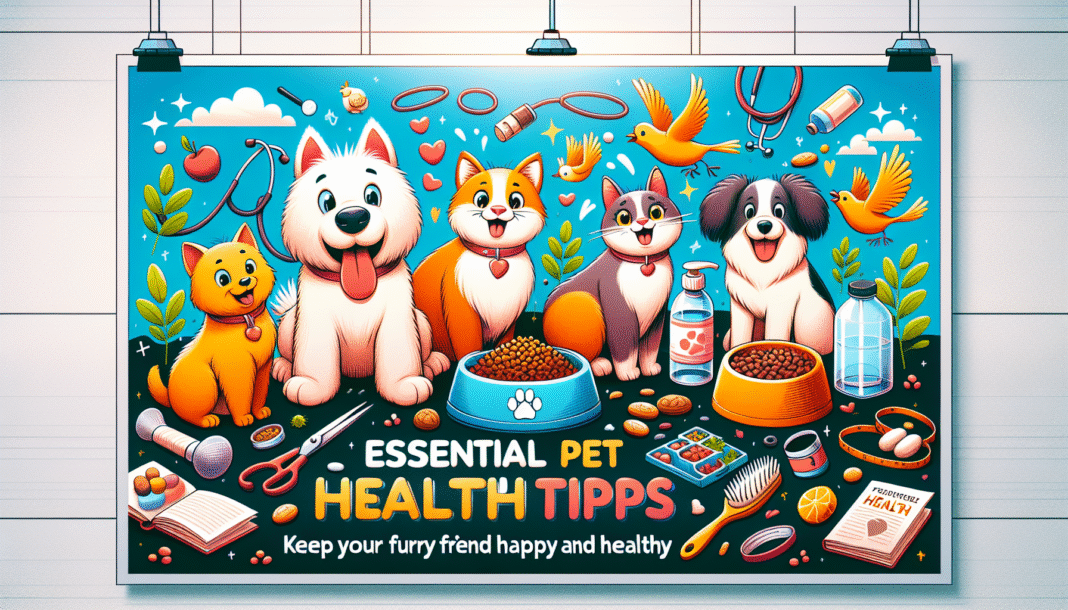As pet owners, we cherish our furry friends, and maintaining their health is a top priority. From preventative care to understanding common ailments, keeping your pets happy and healthy requires attention and love. This article provides essential pet health tips that will help you navigate the intricacies of pet care, ensuring your companion leads a long, fulfilling life.
Understanding Common Pet Health Issues
Causes and Symptoms
Pets can suffer from various health issues, including obesity, dental disease, and allergies. Understanding these common problems can help you detect symptoms early.
Obesity
Causes: Overfeeding and lack of exercise are primary contributors. Many pets enjoy treats, but too many can lead to weight gain.
Symptoms: Look for difficulty in movement, excessive panting, or fatigue. A simple way to assess your pet’s weight is by checking their ribs—if you can’t feel them, it’s time to reconsider their diet.
Dental Disease
Causes: Poor dental hygiene leads to plaque buildup, which can result in gum disease.
Symptoms: Bad breath, difficulty eating, and swollen gums are signs of dental issues. Regular check-ups can help catch these problems early.
Allergies
Causes: Allergies can be environmental (pollen, dust) or dietary (specific ingredients in pet food).
Symptoms: Frequent scratching, hot spots, or digestive issues may indicate allergies. It’s vital to identify the allergen through vet consultations.
Regular Veterinary Check-Ups
Importance of Routine Visits
Regular veterinary visits are crucial for preventive care and early detection of health problems. Vaccines, parasite prevention, and routine screenings can help identify issues before they become serious.
Vaccinations
Keeping your pet’s vaccinations up to date protects against common diseases. Discuss with your vet about which vaccines are necessary based on your pet’s lifestyle.
Parasite Control
Regular flea and tick prevention as well as heartworm testing is essential, especially in warmer climates. Your vet can recommend the best products for your pet.
Nutrition: The Foundation of Health
Choosing the Right Diet
Diet plays a critical role in your pet’s health. Understanding nutritional needs based on age, breed, and activity level ensures they receive balanced meals.
Age-Specific Diets
Kittens and puppies require more calories and higher protein levels than adult pets. Similarly, senior pets may benefit from diets formulated for weight management and joint support.
Nutritional Labels
Look for pet foods that list quality proteins as the first ingredient and avoid those with fillers like corn and soy. Consulting your veterinarian can help you choose the best food.
Exercise: Keeping Them Active
Daily Physical Activity
Physical activity is vital for your pet’s physical and mental well-being. Regular exercise helps combat obesity and improves mood.
Types of Exercise
- Dogs: Daily walks, fetch, and agility training can be great ways to keep them active.
- Cats: Interactive toys like laser pointers or feather wands can stimulate play and exercise.
Tailoring Exercise Routines
Consider your pet’s age and health when planning activities. An older dog may need shorter, more frequent walks, while a young, energetic dog might enjoy a longer romp at the park.
Grooming: Beyond Aesthetics
The Importance of Routine Grooming
Regular grooming is not just about keeping your pet looking good; it’s essential for their health too.
Coat Care
Different breeds have varying grooming needs. Regular brushing helps prevent matting and reduces shedding. For dogs and cats with long hair, consider professional grooming services.
Nail Trimming
Overgrown nails can cause discomfort and lead to injuries. Regular trimming is essential, so schedule this monthly or consult your vet if you’re unsure how to do it safely.
Mental Health: A Happy Mind
Understanding Pet Behavior
Just like humans, pets can experience stress and anxiety. Understanding their behavior helps address mental health needs.
Signs of Stress
Watch for signs of stress, including excessive barking, hiding, or destructive behavior. These may indicate that your pet requires more mental stimulation or a change in environment.
Enrichment Activities
Provide puzzles, new toys, or training sessions to engage your pet mentally. For dogs, consider obedience training or scent games, while cats may enjoy puzzle feeders to stimulate problem-solving.
Symptoms Requiring Immediate Attention
Recognizing Emergency Signs
Knowing the signs that require a visit to the vet can make a significant difference in your pet’s health outcome.
Common Emergency Symptoms
- Persistent Vomiting or Diarrhea: This could indicate a serious condition, especially if it’s accompanied by lethargy.
- Difficulty Breathing: Struggling for breath can be a sign of respiratory distress. Seek immediate veterinary care.
- Inability to Urinate: This is a medical emergency, particularly in male cats.
Preventative Care: The Key to Longevity
Taking Proactive Steps
Preventative care goes beyond vaccinations. Regular dental checks, parasite prevention, and nutritional assessment can contribute significantly to your pet’s longevity.
Conclusion
By following these essential pet health tips, you can help ensure your furry friend leads a happy and healthy life. Understanding health issues, maintaining proper nutrition, and recognizing the signs of distress are vital components of effective pet care. Remember, your veterinarian is an invaluable resource for any concerns you may have about your pet’s health and well-being. Together, you can create a healthier environment for your beloved companion.





